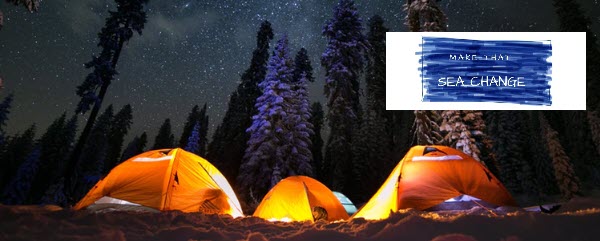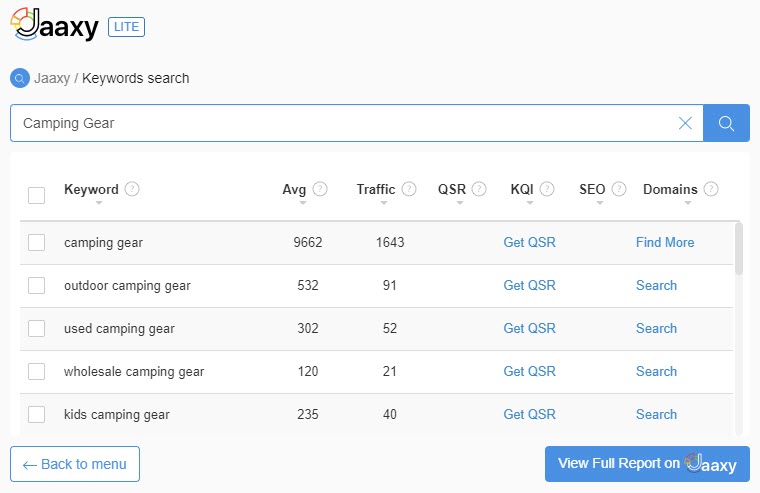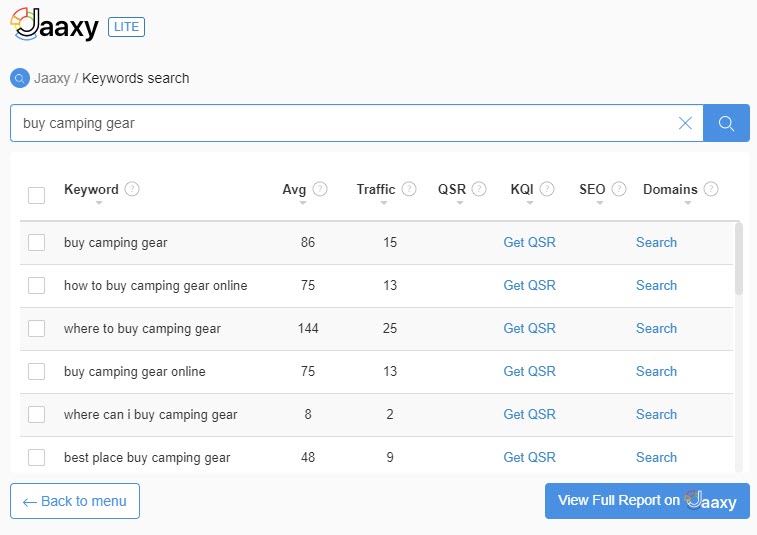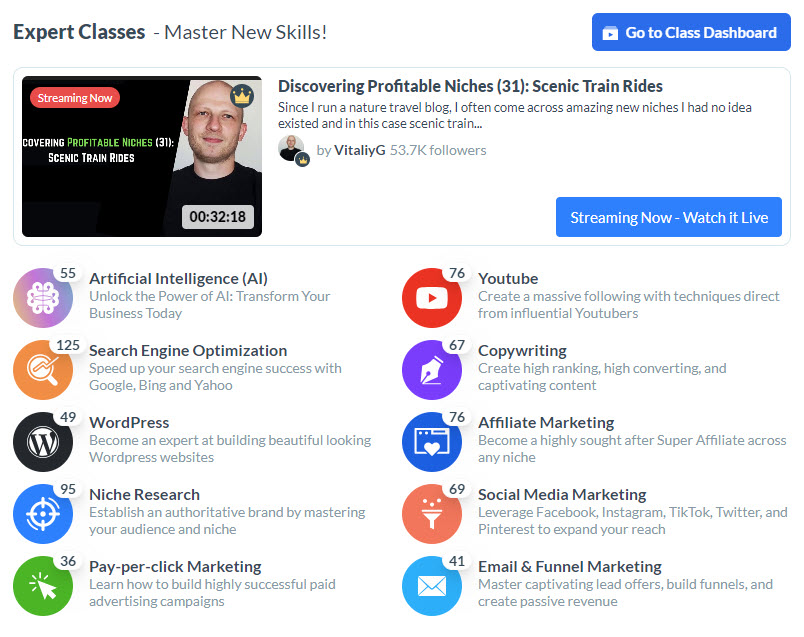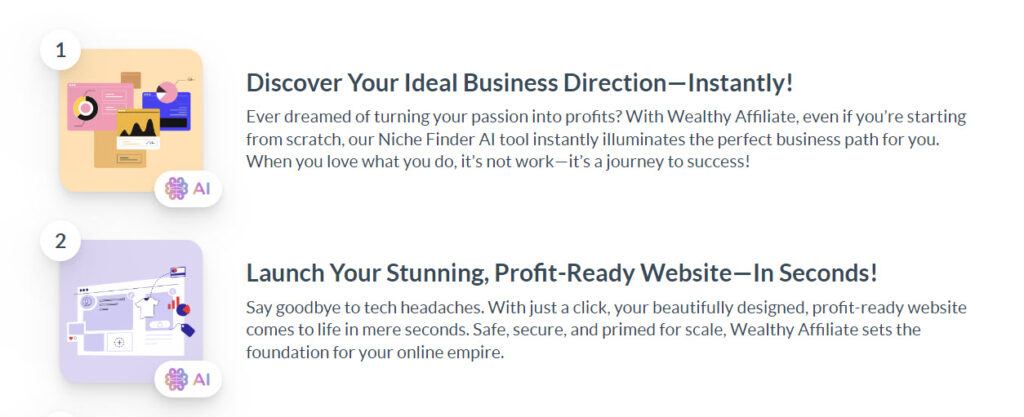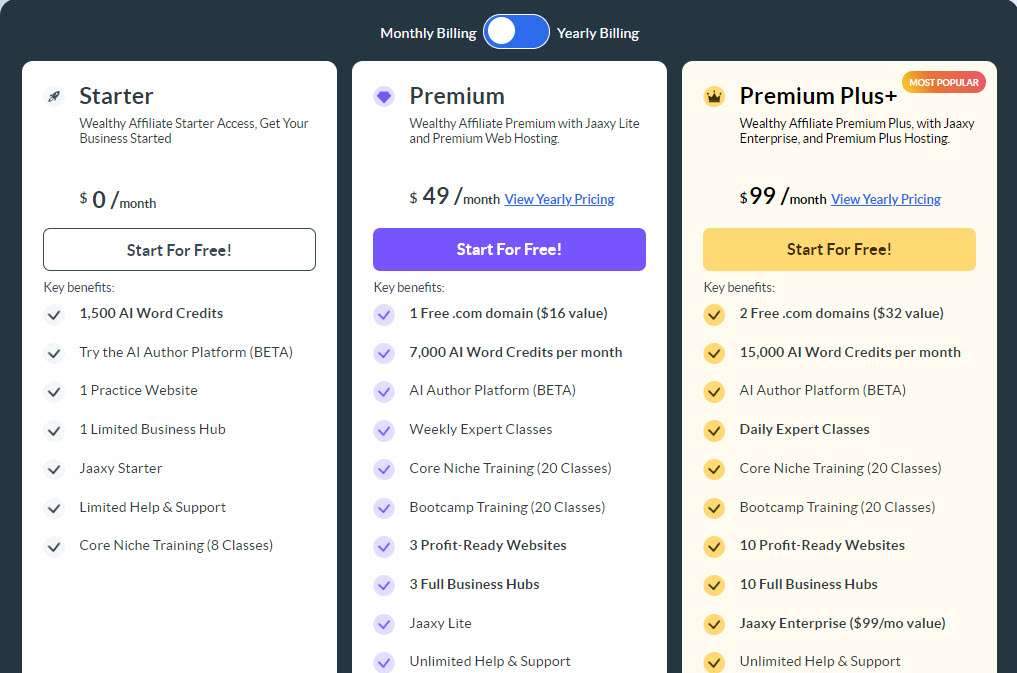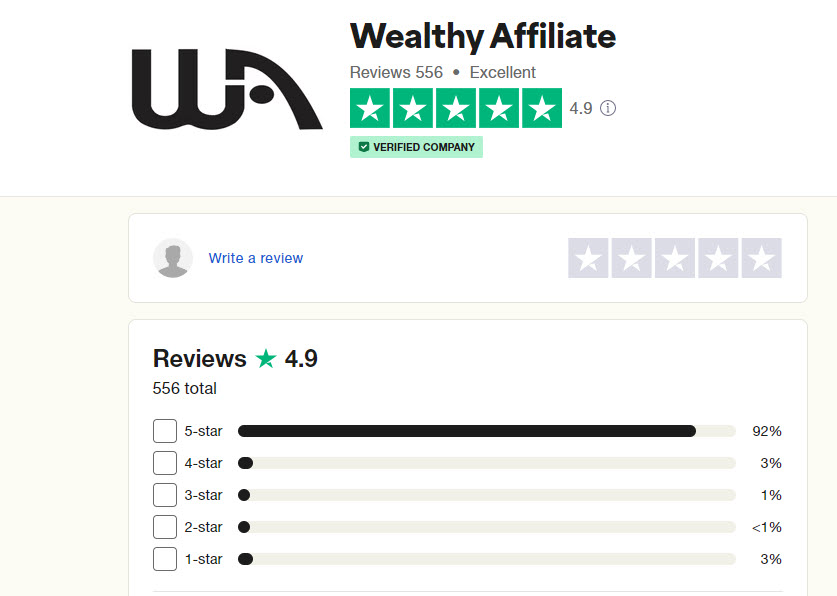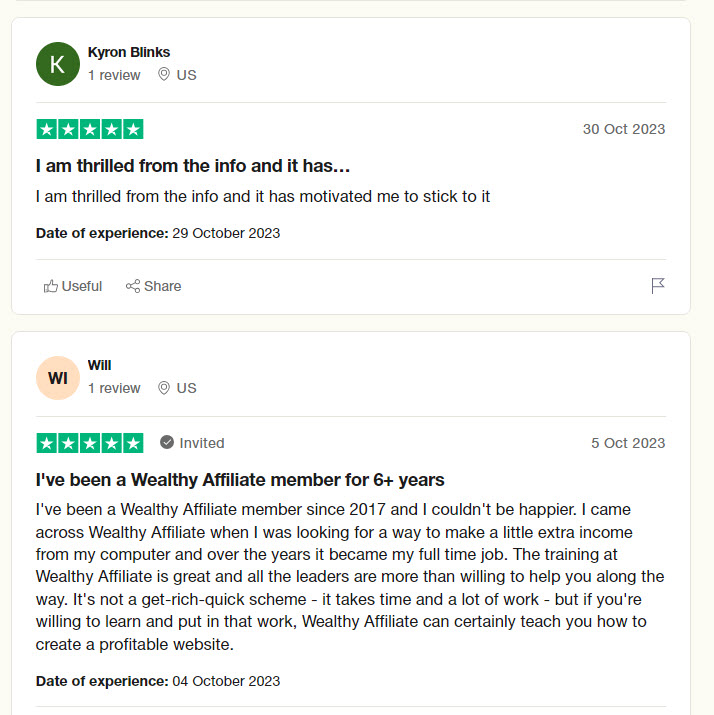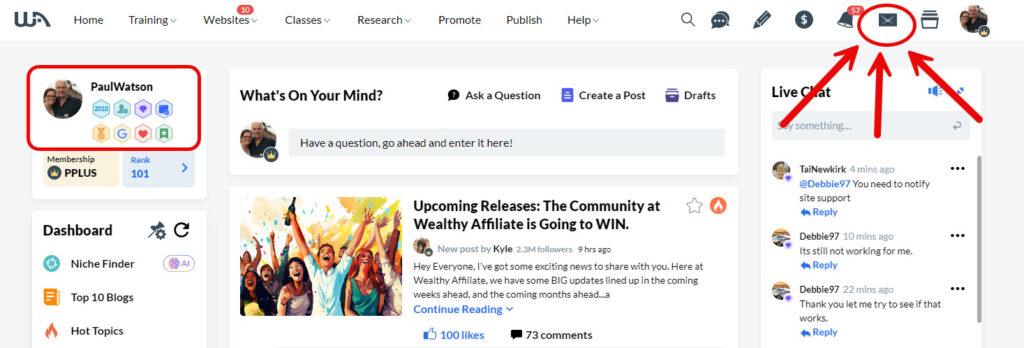Hey there Sea Changers and welcome back. One of the advantages to living and funding this sea change is that hopefully there is some extra time to do some of the more fun things in life, including camping. Now, if this is something that you enjoy and is of interest to you, then why not check it out as a potential money making venture online. Now of course you don't have to do it alone as I am here to fill you in on all the information you might require as I outline how to sell camping gear online.
How did this pop into my head you may ask? Well this weekend we are going camping – the weather is getting warmer and it is time to dust off the camping gear and get stuck into it. As I was preparing for this however, I had forgotten about the camping table that got damaged during the last trip (probably under circumstances best not discussed here haha). But regardless, I went online in an attempt to find a camping table – there a few sites that sell camping gear but not a lot of competition for sites that actually explain it all to you and/or solve problems – so I though I would write about it…
How do we get started?
Now, a lack of competition can mean one of two things:
- There is no market for it.
- It has snuck under the radar and is an untapped market.
I suspect it is the latter, but let's just check the numbers to be sure.
What are people looking for?
To start let's just confirm our market numbers:
1. Number of monthly searches
The first thing we need to do here is check if it is actually worthwhile pursuing as a potential online business. And the best way to determine this is to see what online searches are being undertaken. You will need to find yourself a good keyword tool (I use Jaaxy) and enter in the keywords that best describe your market. In this case, let's start with the basics:
Wow – with sub searches, there are over 10000 searches per month – that is really good. Let's check a little further for a more specific search related to our needs:
There are also some good numbers here (there are a lot of variations further down not visible in the pic above) and it definitely shows that people are at least looking for how and where to buy camping gear – with over 200 searching to buy online. You job will be to convince all of them to buy online even if they are just searching for their local store – we will discuss this more later. Finally, whilst we are here let's just see what variations people are searching for:
Again, a good number of searches and some good ideas for problem solving and niche selection – again, we will revisit this soon.
2. Growth trends
Another important aspect of online sales and niche selection is to check that interest is maintained or increasing over time. To gain an insight into this let's check out how camping gear related searches are trending online.

So what does this tell us? Well let's break it down:
- Interest in purchasing these products has been well maintained, if not risen slightly over the past 5 years.
- There is a definite spike in sales over the warmer northern hemisphere months – not Christmas like other products.
- There are opportunities to promote winter camping gear that may not be well covered by others.
All in all, I see a really good opportunity here.
What is our niche?
Ok, now the fun part begins – we need to start looking at breaking down our market into a niche. Camping might be a niche that you can manage on its own or you might choose to break it down a little and specialise. Regardless, based on some research (albeit not extensive), here are some ideas
- General camping – Setup, maintenance, tips tricks etc.
- Beach camping
- Snow camping
- Lightweight camping
- Backpacking
- Motorcycle camping
- Camping with kids
- Camping for oldies
- High ticket items – overseas trekking tours, caravans, campers etc.

There really is no limit to the amount of subject content here, however as you work through narrowing your targeted niche, consider the following:
- Are you able to solve a problem – Most people undertake searches on the internet to solve a problem – see next section.
- Is it a subject that you have an interest, or knowledge in– I am guessing that you are in this post as you know about, or have an interest in camping. If you don't have either of these, maybe consider another market as, to be honest, you might struggle to produce solid content if you don't know much about it – or worse, have no interest in the magic of sleeping in a tent – and trust me, people will know immediately if your information is not up to scratch.
Let's investigate this a little further by discussing the problem solving elements of niche selection.
[elementor-template id=”3325″]
What problem are we solving?
Now, you may already know what it is that you are trying to sell. If not, then maybe start to look at it from the perspective of solving problems.
Think about your own search behaviours when you are online – I would hazard a guess that most searches you do are in order to solve a problem. These can be in a number of ways such as:
- You know that you want to go camping but don't know how to do it.
- You have a problem and need a solution – I.e. “I have a leak in my tent and don't know how to fix it”.
Your goal here is to determine just what problem/s you are trying to solve for your readers. This may be one problem that spans your site or differ for each post that you write. For example, if you have chosen general camping for your niche, then problems might be:
- Equipment choice – they want to go beach camping but don't know which equipment is best.
- Which to buy – they are tossing up between a 3 and 4 man tent – but which is best?
- Camping techniques – they know it is going to rain and want to know how to keep water out of the tent in the night?

In these cases, people would be searching for those topics based on having a problem and needing a solution. Your site would outline and review the best options for them.
Alternatively, if your site is about lightweight camping for hikers for example, then you would be addressing problems such as the fact that I know I want to purchase a lightweight tent but don't know which is best. You would then be outlining the best tents based on:
- Sleeping size
- Weight
- Folding size
- Carrying techniques
- Other features and benefits
- Accessories and compatible items
- And so on
Note: You do not need to identify every possible problem that your readers may have straight away. In many cases, the more you write, the more ‘problems’ will present themselves so initially you really just want to make sure that there are some that may need solving as we have found here.
How are you going to convince them to buy?
I mentioned earlier in this post that I found a lot of sites that simply listed all the camping gear that they sell (which means there are affiliate programs for them) but not a lot that actually addressed the problems that people might face when camping – did you know that over 600 people per month search for information around camping in the rain? So to my way of thinking, if you are able to build a site that addresses camping problems, then you are half-way there already.
The second thing to remember is that camping fits squarely within the hobby niche meaning that people will spend money on it but will need to be confident that it is worth it. So at the end of the day, you need to find ways to convince people that you know what you are talking about and that they can safely purchase from you. Here are some ways that you can do that:
- Provide information without sales – That's right – write your posts in a way that actually makes it easy for people to do their research without having to purchase from you. By doing this, you are solving problems and helping readers out. If they trust you, they will be more likely to return next time and buy from you then – especially if you follow up with posts on ways to make their camping trip as problem free as possible.
- Provide the intangibles – At the end to the day, camping trips are all about the experience. If you can portray that in your pages with photos and videos of people having fun with the products you are promoting you are going to go a long way towards making the sale. Think about a 4WD/SUV ad on TV, do they just show a picture of the vehicle, or do they film it driving up sand dunes or over a country dirt track? A line of standard products is all well and good, but if you can show the fun and happy side of camping in your posts, you will not only attract viewers, but build a loyal following as well.

- Highlight advantages – Are you cheaper, does your vendor provide a good warranty, free shipping or a bonus discount? You will be surprised how many will suddenly not need to go elsewhere if they are saving money. Also, be clear to outline returns policies etc.
- Know your audience – A big mistake many make here is to not target the real needs of the buyer. This is especially important when dealing with the different types of camping niches. Family campers might be looking for ways to make their trip easier and their families safe whereas professional hikers will be all about the features and benefits. Make sure that you understand what it is that your target audience is after and what they like and don't like. That way you can appeal directly to them and keep then interested in your site.
Tip: Still not sure? Have a look and see what others are doing. It might just help you with some ideas.
That's right! Wealthy Affiliate provided me with all of the tools and training I needed to get this post in front of my audience - a.k.a YOU!
You too can start your very own online business here that can make you money from anywhere in the world!!
How do we sell them?
Ok, so we have an idea that we want to sell camping gear and that there is a market, we now need to consider what products we are going to promote. Let’s have a look at some of the best avenues for selling within the camping gear niche:
Affiliate programs
Affiliate marketing, in short, this means that you will write about camping gear by solving problems and then referring your readers to a link where they will purchase directly from the vendors. You then make your money via commissions from those vendors. Affiliate programs are setup directly by companies or marketplace platforms (Amazon, Ebay etc.) that allow you to join and then refer traffic to them via customised affiliate links.
To find affiliate programs in the camping gear space, simply type “affiliate: niche” into your search engine (where niche is the specific area that you are working in). Below is an example for camping gear affiliate programs:

Note: search results tend to be geographically based to search results will differ depending on your location.
From here you can search through and find programs that:
- Relate to your niche/problems that you are solving.
- Have quality products – your brand can be severely damaged if you promote poor quality products or fake brands.
- Have solid payment and customer service arrangement.
- Pay decent commissions.
- Have good testimonials covering commission payouts and quality of product.
In most cases, you will need to apply for the program before you are allowed to promote their products – don’t take this step lightly or you will be rejected. Affiliate programs will generally want to know:
- Your website name.
- Traffic levels.
- Why you want to join – (so I can make money by selling your tents is unfortunately not generally a good enough answer).
- How you plan to promote their products.
One thing to be aware of here I guess is to keep in mind the issues we discussed earlier in regards to selling camping gear online. You need to make sure that the programs you choose can be trusted and that the consumer is comfortable that they not only have recourse if something goes wrong, but are not putting their enjoyment of camping, or the safety of their families at risk. For this reason you will need to make sure that your chosen programs are going to resonate with your readers and your niche.
That said, some marketplace programs such as Amazon and EBay can give you access to these types of products and as they are more trusted, then they may be worth a look for sure. Some Amazon examples are as below:
Dropshipping
Dropshipping is similar to affiliate marketing in that you are generally promoting the products of others without the need to actually hold any inventory and can be a solid market in any niche where larger items are being purchased – such as tents and camping equipment.
As we discussed in the last section, with affiliate marketing you are paid a commission on whatever price the vendor sets but do not manage any customer service, sales processes or post sales requirements. The main difference with dropshipping, is that you perform the following (there are a number of variations to this but this is the guist of it):
- Strike a relationship with a wholesaler.
- Promote the product for whatever price you see fit – often via a marketplace site such as Shopify, Amazon or Ebay.
- Manage the sales processes and customer service.
- Send the final order and payment to the wholesaler for packaging and shipping.
The money that you make is effectively the different between whatever you managed to sell the product for and the wholesale price that you owe the vendor. The other advantages of dropshipping over affiliate marketing is that:
- You own the customer list – which is another means of building an effective email list.
- You control the cost of the product and hence the profit margins.
- You can control when you put things on ‘sale', group them in packages or increase the price for high demand items.
The disadvantages however are the extra workload in handling payment and any ongoing customer service requirements.
To find dropshipping suppliers online, you can enter “‘niche': supplier” into your favourite search engine:

Note: Again, these results will usually be based on your geographical location.
From here you can search through and find programs that:
- Offer dropshipping services – Not all product suppliers offer dropshipping as a service.
- Have experience and are helpful – If they are not helpful and/or appear inexperienced then you can expect the same when you are trying to process sales.
- Have acceptable fees – most dropshipping wholesalers will charge a small fee for the dropshipping service – just make sure it is not so high that it eats into your profit margins.
- Provide fast shipping – One disadvantage with dropshipping when dealing with vendors is that the customer is yours, not theirs hence sometimes shipping priorities are not where they should be – make sure shipping times are acceptable.
- Have quality products – as with affiliate marketing, don't sell rubbish.
- Have a good name – do your research and see what others are saying about them.
Sell your own
If affiliate marketing or dropshipping are not your cup of tea, maybe you could try sourcing and selling your own products. This process is especially popular with those selling camping accessories (poles, pegs, tarps etc.) and commonly referred to as White Labeling. Here you actually purchase your product from a vendor or wholesaler, add your own label and then on-sell them via your website or platforms such as Amazon etc.
This process requires a much higher setup costs as you will need to purchase your products, create and affix your labels and manage orders and shipment. Some wholesalers/vendors however will affix the labels that you send them and then manage the packaging and shipment for you (see dropshipping above). This will cost you less to set up but obviously you will make less on the sale once they take their processing fee.
Again, to find out where to acquire your product, do a search for “white label: niche”:
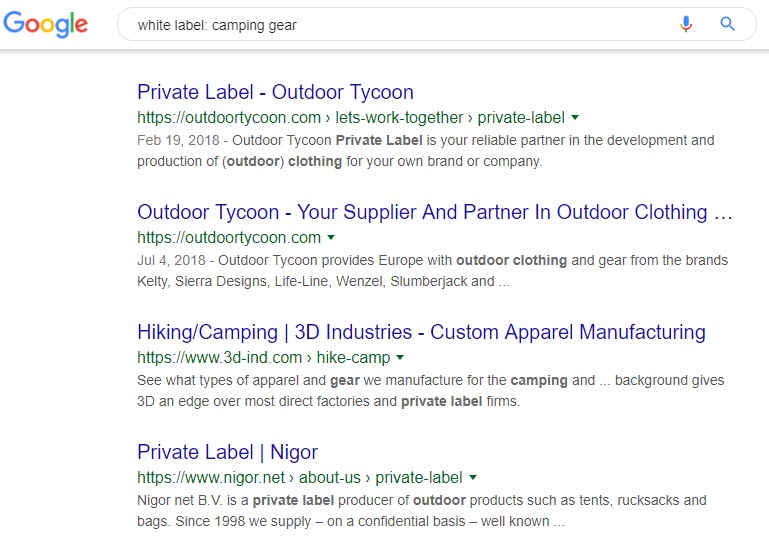
From here you will need to follow the same processes as with affiliate and dropshipping programs in determining whether they are a good fit for your business plans including:
- Relate to your niche/problems that you are solving.
- Have solid delivery and customer service arrangements.
- Have good testimonials covering service and quality of product.
Alternatively, keep your eye out in your local area for camping, boating, fishing or caravan related exhibitions and trade shows. These are a great way to find and purchase your products at good prices – you never know, you might even find a solid supplier for future sales as well.
Tip: This method can be very effective in driving online traffic and sales via the implementation of more traditional sales methods such as kiosks and market stalls etc. As people get to know you, they can purchase from you there and then be directed to your website for future sales.
What do we need to do?
And finally, we need to choose and setup the media that we intend to use to sell our product. This can include:
Build a Website
Websites allow you to solve problems via blog posts, videos and/or ‘how to' demonstrations that people can view in order to identify the solutions that they need. Usually, this process is fairly straight forward in that you build your website, write posts (on the best camp stove for windy conditions for example), then provide links so that they can view/purchase the relevant food online.
That's right! Wealthy Affiliate provided me with all of the tools and training I needed to get this post in front of my audience - a.k.a YOU!
You too can start your very own online business here that can make you money from anywhere in the world!!
Promote on Social Media
Social media is a powerful platform that can allow you to get your message out there into the big wide online world with the ability to reach thousands. It also allows you to target specific segments if you choose the correct platform. In terms of selling camping online, a good platform to start with might be something like Instagram or Pinterest. These platforms allow for the visuals and ‘mood' aspects of camping to be highlighted to your visitors. If you are demonstrating how to pitch a particular tent type however then YouTube would be the way to go.
Join like-minded groups
The beauty about hobby niches such as camping is that regardless of the sub niche you have chosen, you can really get amongst your target audience quickly as there is usually some sort of social media group, online forum or membership page that you can join to gain exposure to potential visitors and sales. FaceBook for example is a great place to gain access to hobby and professional groups alike and can not only allow you to interact with customers but also gain more information and education in terms of content ideas for your posts or products.

Don't forget to think outside the box a little here too. 4WD and hiking groups for example often camp as well. Or check out some caravan groups who will discuss accessories they may be after potentially opening you up to a whole new market.
Note: Many of these groups will not allow you to spruike or promote your sites directly, however if you can interact and demonstrate your knowledge then people will ask you privately for the information. At the very least, as above, it is a great way to get ideas and insight into what people in this area really want to know about and what they are buying online.
Conclusion
And there it is – How to sell camping gear online. I hope it has been helpful and as usual, please do not hesitate to comment below if you have any questions, need some advice or have any experiences to share.
Do you want further assistance with any of the above or need help to build your own camping based website?
Are you looking for a comprehensive training platform that can give you step by step training, 24/7 support, tools to develop and host your very own camping based website, ongoing assistance with SEO and social media and access to some of the best affiliate marketing minds on the planet, then click on the following link to read more about Wealthy Affiliate.
Until next time
Have fun
Paul
Note: If you make a purchase from this page, there is a very good chance that I make a commission from it – these commissions do not increase your sale price.
